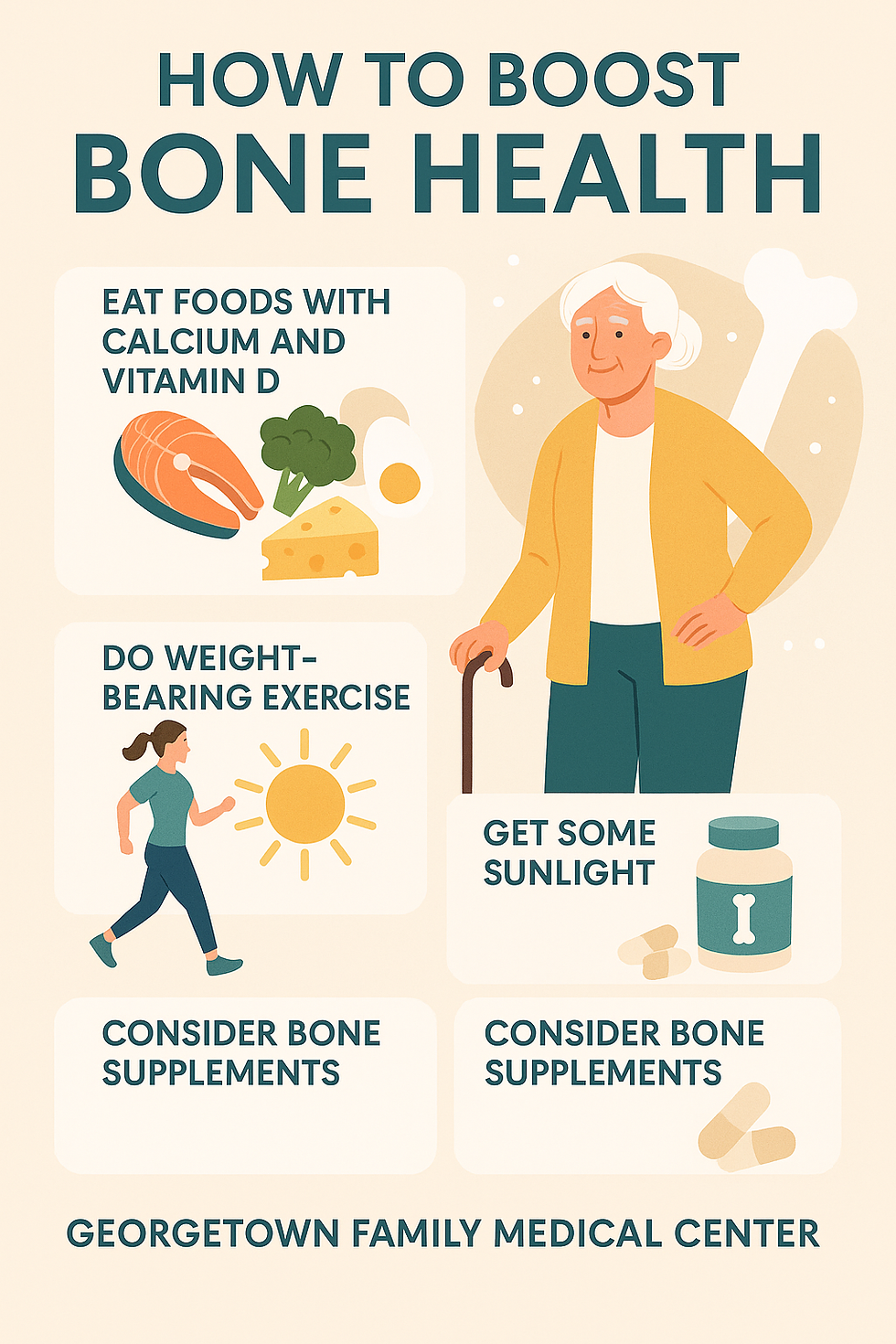🦴 How to Boost Bone Health – Guidance from a Georgetown Family Medical Center
- Dr. Mohammad Al Darawsha MD

- May 15, 2025
- 3 min read
As we age, our bones naturally become thinner and more fragile — but that doesn’t mean fractures or osteoporosis are inevitable. At Wellness Bay Primary Care, we help patients of all ages protect their bone strength with simple, evidence-based strategies.
If you’re looking for trusted care at a Georgetown family medical center, this guide is a great place to start.
🧠 Why Bone Health Matters as You Age
Your bones support everything you do — walking, bending, standing, even breathing. But after age 50, bone loss can speed up, especially in women after menopause.
We focus on early prevention and detection at our family practice center, helping you stay mobile, independent, and pain-free.
⚠️ Risk Factors for Weak Bones
➤ What Your Georgetown Family Medical Center Team Will Check For:
Age 50+
Female gender (especially postmenopause)
Low calcium or vitamin D intake
Smoking or excess alcohol
Sedentary lifestyle
Family history of osteoporosis
Long-term use of steroids or acid reflux meds
Previous fractures or height loss
🥦 Foods That Support Strong Bones
Eating for bone health means giving your body the building blocks it needs to maintain structure and density.
✅ Best Nutrients for Bones:
Calcium: dairy, leafy greens, almonds, fortified juices
Vitamin D: salmon, egg yolks, fortified milk or cereals
Magnesium: beans, nuts, whole grains, dark chocolate
Vitamin K2: spinach, kale, fermented foods
Protein: lean meat, tofu, legumes, dairy
✅ Tip: At our Georgetown wellness clinic, we check vitamin D levels during routine exams.
🏃♀️ Lifestyle Habits That Build Stronger Bones
1. Weight-Bearing Exercise
Walking, dancing, climbing stairs, or tai chi stimulate bone growth.
2. Strength Training
Lifting light weights or resistance bands improves bone and muscle strength.
3. Fall Prevention
Clear clutter, use grab bars, wear proper shoes, and manage medications that cause dizziness.
4. Sunlight (Vitamin D)
Get 10–15 minutes of direct sunlight 3–4 times/week for natural vitamin D production.
5. Quit Smoking and Limit Alcohol
Both contribute to faster bone loss — we’ll help you make sustainable changes at our Georgetown family medical center.
💊 Bone-Boosting Medical Treatments
We may recommend:
Calcium and vitamin D supplements
Bone density testing (DEXA scan)
Prescription medications for low bone density
Fall risk screening if you’ve had a previous fracture
All of these services are available or coordinated through our primary care physician in Georgetown TX.
✅ Top 10 FAQs About Bone Health
1. When should I start checking my bone health?
Women over 65 and men over 70 should have regular bone density tests — or earlier if risk factors are present.
2. How much calcium do I need?
Most adults need 1,000–1,200 mg/day — through food or supplements.
3. Can I reverse bone loss?
You can’t fully reverse it, but you can slow or stop it — sometimes even regain strength with the right plan.
4. What’s the best exercise for bones?
Walking, light strength training, and balance exercises like tai chi.
5. Do men get osteoporosis?
Yes, though less often than women — it’s often underdiagnosed.
6. Is it too late to improve my bone health after 60?
It’s never too late — healthy changes still help!
7. Are supplements safe?
Yes, when dosed properly — we help you choose the right ones.
8. How often should I get my bone density tested?
Every 1–2 years if you're at risk or already diagnosed.
9. Can certain medications hurt my bones?
Yes — some acid reflux, seizure, or steroid medications can affect bone density.
10. Where can I get help in Georgetown?
Right here at Wellness Bay Primary Care, your Georgetown family medical center.
💬 Let’s Take Care of Your Bones — Together
Whether you’re preventing bone loss or managing osteoporosis, we’re here to support you with personalized advice, testing, and follow-up.
📍 Visit us at 4887 Williams Dr Ste 107, Georgetown TX
📞 Call 512.588.7008 or




